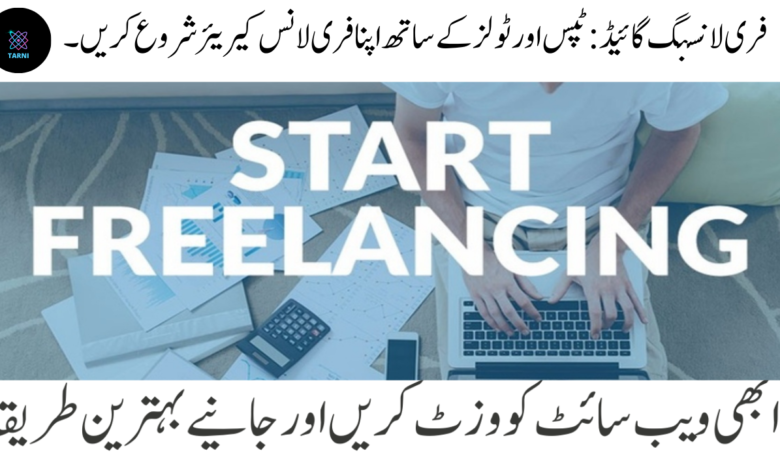Freelancing Guide: Start Your Freelance Career with Tips & Tools

Freelancing has become one of the most popular career paths in recent years. With the rise of digital platforms and remote work, the opportunity for individuals to work independently has never been greater. Whether you’re just starting out or are an experienced freelancer looking to scale your business, this guide will provide you with everything you need to know to succeed in the freelancing world.
What is Freelancing and How Does it Work?
Freelancing is essentially an independent work arrangement where professionals offer their skills and services to clients on a project-by-project basis. Unlike full-time employees, freelancers are not tied to a single employer but instead have the flexibility to work with multiple clients. Freelancers can offer a wide range of services, including graphic design, writing, web development, marketing, and more.
How Freelance Jobs Function
Freelancers generally work under contracts that specify the terms of their work, including the deliverables, timelines, and payment structure. Some freelancers work hourly, while others set flat-rate prices for specific projects. A key aspect of freelancing is flexibility; you choose the projects that align with your skill set, interests, and desired income level. Freelancers can work from anywhere, whether it’s from home, a coffee shop, or while traveling, making freelancing a popular choice for those seeking a better work-life balance.
Freelance Marketplace
Freelance marketplaces are platforms that connect clients with freelancers. These platforms offer a convenient way for clients to find skilled professionals and for freelancers to find work. Popular freelance platforms like Upwork, Fiverr, and Freelancer.com provide an easy-to-use interface, ensuring both clients and freelancers can communicate, track work progress, and securely manage payments. Freelance marketplaces are particularly helpful for beginners, as they offer a broad range of opportunities to build experience and a portfolio.
The gig economy, which emphasizes temporary or short-term jobs, is flourishing, and freelance platforms have become the cornerstone of this new way of working. These platforms cater to various industries and allow freelancers to access a global market.
How to Start Freelancing with No Experience?
Starting out as a freelancer with no experience can seem intimidating, but it’s entirely possible to succeed if you take the right steps. It might take a little extra effort initially, but once you get your first few clients and build your reputation, things will become smoother.
Choosing the Right Freelance Skills
The first step to starting a freelancing career is selecting the right freelance skills to offer. If you’re just beginning, it’s essential to focus on skills that are both in-demand and match your strengths. Freelance writing, web development, graphic design, social media marketing, and SEO are examples of highly sought-after freelance skills. Many of these fields offer learning resources, certifications, and boot camps that you can pursue to sharpen your skills.
For those who don’t have a specialized skill yet, there are plenty of online courses available on platforms like Udemy, Coursera, and LinkedIn Learning, which can help you develop the necessary skills for freelancing. Starting with a few free or low-cost learning resources can be a good approach.
Creating Your Freelance Portfolio
Even if you have no formal freelance experience, you can still create a portfolio that highlights your skills and potential. A well-organized portfolio is one of the most powerful tools for attracting clients. You can start by showcasing any personal projects, internships, volunteer work, or even projects you completed as part of your courses or training. For example, if you want to become a freelance web designer, you can create a website for a fictional company or design sample websites to show your abilities.
Your portfolio should clearly demonstrate your expertise, so potential clients can see how you can help them solve their problems. Over time, as you build experience, you’ll be able to update your portfolio with more professional work.
Setting Up Profiles on Freelance Platforms
Freelance platforms are an excellent way to get your foot in the door as a beginner. These platforms provide you with access to a vast pool of clients looking for skilled freelancers. Popular platforms like Upwork, Fiverr, Freelancer.com, and Guru are great starting points. When setting up your profile, be sure to include:
- A professional profile photo
- A compelling bio that highlights your skills and experience (even if it’s limited)
- A list of services you offer
- Relevant work samples (if you have any)
If you’re unsure where to start, consider beginning with low-cost services or “micro-jobs” to build your reputation. As you gain experience and positive reviews, you can gradually increase your rates and attract higher-paying clients.
Best Freelance Platforms to Get Started
Several freelance platforms can help you launch your career, but some stand out due to their popularity, reputation, and diverse range of opportunities.
Upwork
Upwork is one of the largest and most popular freelance platforms. It caters to a wide range of industries and offers both short-term and long-term projects. Upwork allows freelancers to create detailed profiles, showcasing their skills, experience, and expertise. The platform also offers clients the option to post job listings, which freelancers can bid on or apply for.
Upwork is known for its secure payment system, where funds are placed in escrow before work begins. Once the project is completed, freelancers are paid according to the terms specified in the contract. For beginners, Upwork is an excellent platform to gain experience and work with reputable clients.
Fiverr
Fiverr is another well-known freelance platform that allows freelancers to offer services starting at $5 per gig. It’s especially suited for freelancers who want to offer specific services like logo design, voiceover work, or website design. The platform is known for its straightforward pricing structure, which allows freelancers to list services and attract clients quickly.
Fiverr is also a great way for beginners to get started, as the platform encourages freelancers to offer services at competitive rates. Over time, freelancers can increase their rates and expand the services they offer as they gain experience and positive feedback.
Freelancer.com
Freelancer.com is similar to Upwork, but it differs in its bidding system. Clients post job listings, and freelancers are required to bid on them. This gives freelancers an opportunity to pitch their services to a broad audience. Freelancer.com offers a wide variety of jobs in fields such as writing, web development, design, marketing, and more.
Freelancer.com provides a unique system for freelancers to manage projects, communicate with clients, and receive payments. Beginners can benefit from the wide range of opportunities on the platform.
What are the Most In-Demand Freelance Skills?
To stand out as a freelancer, it’s important to hone skills that are in high demand. In 2025, some of the most sought-after freelance skills include:
High-Paying Freelance Jobs in 2025
- Web Development: As more businesses shift online, web developers are needed to create and maintain websites. Front-end, back-end, and full-stack web development skills are highly valuable in the freelance market.
- Digital Marketing: Freelancers with expertise in SEO (Search Engine Optimization), PPC (Pay-Per-Click), and social media marketing are in high demand as businesses seek to enhance their online presence and increase their reach.
- Content Writing & Copywriting: Content creation is essential for businesses looking to engage their audience. Freelancers with strong writing skills are sought for tasks like blog writing, SEO articles, website content, and product descriptions.
Skills for a Successful Freelance Career
Freelancers also need to develop soft skills to succeed in their careers. These include:
- Communication: Freelancers need to effectively communicate with clients, understand their needs, and deliver clear updates on project progress.
- Time Management: Freelancers juggle multiple clients and projects, so staying organized and adhering to deadlines is crucial.
- Negotiation: Negotiating rates and project terms ensures that freelancers are compensated fairly for their work.
How to Set Your Freelance Rates and Negotiate Pricing?
Setting your rates is one of the most crucial aspects of freelancing. It’s important to know how much to charge so that you can stay competitive, but also make sure your rates reflect the value of your work.
Freelance Pricing Strategies
- Hourly Rates: When you’re just starting out, charging an hourly rate might be easier, as it allows you to charge for the actual time spent on a project.
- Project-Based Fees: Once you gain more experience, consider switching to flat-rate pricing for specific projects. This is ideal for well-defined tasks like creating a website or writing a certain number of articles.
- Retainer Agreements: Some clients may prefer to work with you on a long-term basis. In such cases, setting up a retainer agreement can provide consistent income.
Negotiating Rates with Clients
Freelancers often negotiate their rates with clients. To successfully negotiate:
- Know Your Worth: Do market research to understand what other freelancers are charging for similar work.
- Be Transparent: Always explain how your rates are justified by the value you bring.
- Start Low, Build Up: If you’re a beginner, it’s okay to start with lower rates to build your portfolio, but don’t undervalue your services.
How to Build a Strong Freelance Portfolio?
Your freelance portfolio is essential for showcasing your skills and attracting potential clients. Even if you’re new to freelancing, a well-organized portfolio will help you land jobs.
Organizing Your Portfolio
Include work that showcases the range of services you offer. If you’re a graphic designer, show examples of logo designs, website mockups, and promotional materials. If you’re a writer, include writing samples like articles, blog posts, and web copy.
Get Testimonials and Reviews
Positive client feedback is one of the most valuable assets you can have as a freelancer. Always ask satisfied clients to leave reviews or testimonials, which will help you build credibility and attract new clients.
Time Management and Productivity for Freelancers
Managing your time effectively is crucial as a freelancer. Here are some productivity tips to ensure you’re staying on top of your work:
Managing Freelance Projects Efficiently
Use project management tools like Trello, Asana, or Monday.com to organize tasks, track deadlines, and communicate with clients. These tools help streamline workflows and keep everything in one place.
Avoiding Burnout
While freelancing offers flexibility, it can also lead to overwork if not managed properly. Ensure you maintain a work-life balance by taking regular breaks, scheduling time off, and setting realistic expectations with clients.
Common Challenges in Freelancing and How to Overcome Them
Freelancers often face challenges, but understanding these obstacles will help you overcome them.
Finding Freelance Clients
Networking is key to finding clients. Attend industry events, join relevant online groups, and promote your services on social media platforms to increase visibility.
Dealing with Difficult Clients
Set clear expectations before starting a project to avoid misunderstandings. Always maintain open communication throughout the project.
Managing Income
Freelancers experience fluctuations in income, so it’s important to have a budget and emergency savings to manage lean periods. Diversifying your client base and creating passive income streams can help stabilize your income.
Conclusion
Freelancing can be incredibly rewarding, both financially and personally, if you approach it with the right mindset and strategies. Start with the basics, build your portfolio, and leverage the best freelance platforms to find clients. By consistently improving your skills and staying organized, you’ll be able to build a successful freelance career that offers flexibility and financial freedom.
Remember, freelancing is a marathon, not a sprint.
FAQs
Can I make a living from freelancing?
Yes, many freelancers make a full-time income by working with multiple clients. The key is to continuously improve your skills, build your portfolio, and maintain long-term relationships with clients.
What are the best freelance websites for beginners?
Upwork, Fiverr, and Freelancer.com are the best platforms for beginners to start with. They offer a wide range of job opportunities and allow you to build your reputation over time.
How can I improve my freelance career?
Focus on refining your skills, maintaining good client relationships, and consistently delivering high-quality work. Building a personal brand and investing in marketing efforts will also help expand your business.


